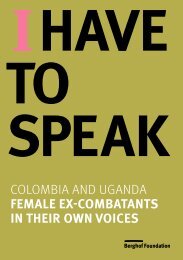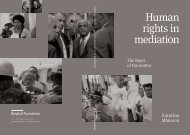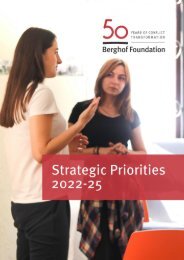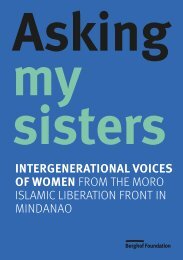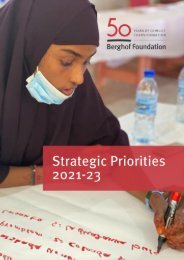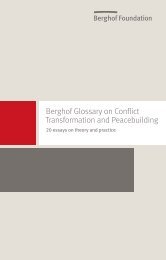Berghof Foundation: 50 years of conflict transformation
This book provides an overview of the Berghof Foundation’s work and impact over the past 50 years and sheds light on the challenges ahead of peacebuilding.
This book provides an overview of the Berghof Foundation’s work and impact over the past 50 years and sheds light on the challenges ahead of peacebuilding.
Create successful ePaper yourself
Turn your PDF publications into a flip-book with our unique Google optimized e-Paper software.
Preventing<br />
extremism<br />
in prisons<br />
Interview<br />
Mohamed<br />
Abdel<br />
Wahab<br />
Rafiqi<br />
Founder and<br />
President <strong>of</strong><br />
Al-Mizane<br />
platform<br />
What is your background, and how did you end up<br />
doing peacebuilding work?<br />
My involvement in peacebuilding comes<br />
from a very personal experience. Having grown up in<br />
a religious, Salafi environment and having received<br />
a typical religious education in Morocco, I became<br />
one <strong>of</strong> the prominent sheikhs in the Moroccan Salafi<br />
movement. Due to this background, I have extensive<br />
experience regarding the contributory factors behind<br />
violent extremism — psychological, socioeconomic<br />
and political — and their religious references. I am<br />
determined to raise awareness about the dangers <strong>of</strong><br />
extremism, to ensure that others do not go through<br />
the suffering I experienced while I was in prison.<br />
Can you tell us more about your work with <strong>Bergh<strong>of</strong></strong>?<br />
My work with the <strong>Bergh<strong>of</strong></strong> <strong>Foundation</strong> can<br />
be divided into two strands. Firstly, I am part <strong>of</strong> the<br />
regional network <strong>of</strong> experts that <strong>Bergh<strong>of</strong></strong> set up to<br />
enhance religious tolerance and address violent<br />
extremism in Egypt, Iraq, Jordan, Lebanon and<br />
Morocco. The network is made up <strong>of</strong> Middle East<br />
experts who meet either online or in person. Since<br />
the beginning <strong>of</strong> my involvement in 2018, the network<br />
has helped me be part <strong>of</strong> a regional exchange <strong>of</strong><br />
diverse opinions, experiences and points <strong>of</strong> view, as<br />
well as knowledge-sharing among fellow members<br />
<strong>of</strong> the network.<br />
Secondly, I have created a manual for<br />
preventing violent extremism in prisons, which<br />
was used in a local training event on “Extremism in<br />
Prisons between De-radicalisation Programmes and<br />
Re-integration.” I met with the network working group<br />
on prisons and preventing violent extremism. I talked<br />
to interlocutors in Tripoli and Beirut and shared best<br />
practices, lessons learned and prevention strategies<br />
used in Morocco.<br />
What do you think was the most important<br />
achievement <strong>of</strong> the project/process you were<br />
working on with <strong>Bergh<strong>of</strong></strong>?<br />
The most important achievement was the<br />
manual, as well as being able to discuss it during<br />
the local initiative training workshops in Lebanon,<br />
thereby combining the theoretical with the practical.<br />
I believe that these workshops were insightful and<br />
enriching, because I was able to learn more about<br />
the Lebanese experience when it comes to Islamist<br />
prisoners and could adapt the manual accordingly.<br />
What was the greatest challenge or difficulty<br />
you encountered?<br />
Convincing imprisoned Islamists <strong>of</strong> the<br />
theoretical, practical and psychological factors<br />
behind radicalisation. Also, such projects require<br />
a great deal <strong>of</strong> support from <strong>of</strong>ficial institutions,<br />
otherwise their chance <strong>of</strong> success is much lower.<br />
The connections and rapports that the <strong>Bergh<strong>of</strong></strong><br />
<strong>Foundation</strong> has built over time helped a lot in that<br />
regard. I was able to address key decision-makers<br />
such as Members <strong>of</strong> Parliament, lawyers from the<br />
Lebanese Bar Association, Muftis and prominent<br />
Muslim scholars during my visit to Lebanon.<br />
Looking at the situation today, what do you<br />
personally take away from this work?<br />
My work in Lebanon opened my eyes<br />
to different factors that contribute to violent<br />
extremism. I felt as if I was discovering a different<br />
phenomenon, all while rediscovering nuances to the<br />
issue as a whole. This led me to new perceptions <strong>of</strong><br />
violent extremism in the Arab world. Today, I am still<br />
in contact with the working group on prisons and<br />
preventing violent extremism in Lebanon.<br />
How are you planning to continue your work with<br />
<strong>Bergh<strong>of</strong></strong> in the future?<br />
Regarding the manual, I am hoping that<br />
the regional network <strong>of</strong> experts will be able to<br />
provide me with feedback. That feedback will then<br />
be incorporated into the manual, further refining<br />
insights into the causes and signs <strong>of</strong> violent<br />
extremism. I will take part in a number <strong>of</strong> projects and<br />
hope that I will be able to combine all my efforts into<br />
one unified campaign to prevent violent extremism.<br />
I also hope that my manual will eventually be the<br />
<strong>of</strong>ficial and approved manual used in prisons.<br />
62<br />
63




